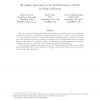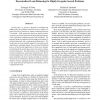52 search results - page 8 / 11 » Sparse Networks Tolerating Random Faults |
128
Voted
STOC
2006
ACM
16 years 2 months ago
2006
ACM
We present a randomized Byzantine Agreement (BA) protocol with an expected running time of O(log n) rounds, in a synchronous full-information network of n players. For any constan...
140
click to vote
ISCC
2006
IEEE
15 years 8 months ago
2006
IEEE
In this paper, we present a Dynamic Load Balancing (DLB) policy for problems characterized by a highly irregular search tree, whereby no reliable workload prediction is available....
101
Voted
SPAA
2010
ACM
15 years 7 months ago
2010
ACM
Consider a set of players that are interested in collectively evaluating a set of objects. We develop a collaborative scoring protocol in which each player evaluates a subset of t...
126
click to vote
DSN
2002
IEEE
15 years 7 months ago
2002
IEEE
This paper describes a Secure INtrusion-Tolerant Replication Architecture1 (SINTRA) for coordination in asynchronous networks subject to Byzantine faults. SINTRA supplies a number...
125
click to vote
OPODIS
2010
15 years 8 days ago
2010
Abstract. Wireless Ad-hoc networks are distributed systems that often reside in error-prone environments. Self-stabilization lets the system recover autonomously from an arbitrary ...


